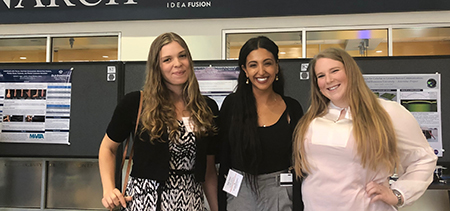
Exploring Impact of Task Complexity on Performance on a Robotic Arm Task
College
College of Sciences
Program
M.S. Psychology
Publication Date
3-28-2019
Abstract
Use of robotic arms is increasing across domains, but the impact of task features and control method on human performance is still not fully understood. As progress toward full autonomy occurs, humans and automation will likely share control in the future, potentially via shedding tasks to the automation. The goal of this work was to investigate how task complexity impacts task time, errors, task completion rate, and task shedding behavior in a robotic arm task. Using a 2 x 2 split-plot design, 40 undergraduates (24 females) used two control devices, a Leap Motion controller and an Xbox One controller, to complete either a high or low complexity peg board task chosen to simulate IED disarmament. Simultaneously, the participants surveyed aerial images for tanks and responded verbally. There were no significant differences on the task complexity dimension. On the number of tasks shed and completion rate variables, there was a stronger impact of task complexity when using the Leap Motion controller than when using the Xbox One controller. The lack of significant effect could be due to insufficient power to detect the interaction or floor effects as overall performance was poor. These findings provide insight into the potential use of motion-capture based devices in the future in both high and low complexity tasks, as well as the shortcomings of such devices. Researchers should further investigate future motion-capture systems at varying levels of task complexity to determine if they are appropriate for sensitive tasks.
Files
Recommended Citation
Long, Shelby and Bliss, James P., "Exploring Impact of Task Complexity on Performance on a Robotic Arm Task" (2019). College of Sciences Posters. 14.
https://digitalcommons.odu.edu/sciences_achievement/14



